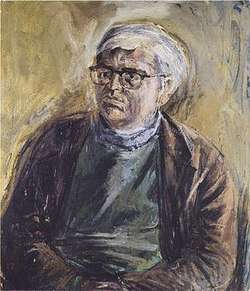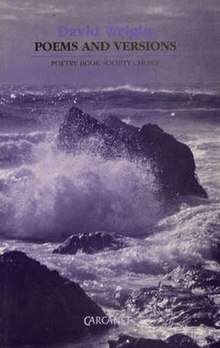David Wright (poet)
David John Murray Wright (23 February 1920 – 28 August 1994) was an author and "an acclaimed South African-born poet".[1]
David Wright | |
|---|---|
 David Wright, by Patrick Swift, c. 1960 | |
| Born | 23 February 1920 Johannesburg, South Africa |
| Died | 28 August 1994 (aged 74) Waldron, East Sussex, England |
| Occupation | Poet |
| Nationality | South African by birth; British |
| Education | Oriel College, Oxford |
Biography
Wright was born in Johannesburg, South Africa 23 February 1920 of normal hearing. When he was 7 years old he contracted scarlet fever and was deafened as a result of the disease. He immigrated to England at the age of 14, where he was enrolled in the Northampton School for the Deaf. He studied at Oriel College, Oxford, and graduated in 1942.
His first work, a poem entitled Eton Hall, was published in 1942–43 in the journal Oxford Poetry.[2]
He became a freelance writer in 1947 after working on the Sunday Times newspaper for five years. With John Heath-Stubbs he edited the Faber Book of Twentieth Century Verse. He edited the literary magazine Nimbus from 1955 to 1956, during which time he published 19 poems, sent to him by Patrick Swift, by Patrick Kavanagh, which proved to be the turing point in Kavanagh's career.[3] He co-founded the quarterly literary review X magazine which he co-edited from 1959 to 1962. His work includes three books about Portugal written with Patrick Swift, his co-founder and co-editor of X. He translated The Canterbury Tales and Beowulf. He penned an autobiography in 1969, and a biography of fellow South African poet Roy Campbell in 1961. Wright also edited a number of publications throughout the 1960s and 1970s. He held the Gregory Fellowship in Poetry at the University of Leeds (1965–67).
Wright was not reticent about his deafness, and his autobiography, Deafness: A Personal Account (1969), is often used to give hearing people an insight into an experience they might not easily imagine.
In 1951, he married Philippa ("Pippa") Reid (d. 1985); and Oonagh Swift in 1987. Wright lived in Braithwaite, just outside Keswick, in the Lake District of England, and became good friends with Norman Nicholson, a fellow poet, and his wife, often visiting each other.
Wright died of cancer in Waldron, East Sussex, 28 August 1994.
Quotes about
- "His poetry was by turns lyrical, satirical and narrative. Sometimes it was fuelled by recollections of his homeland, although he was not politically active on South African issues." – The New York Times)
- "profuse, fluent, versatile" and "the foremost South African poet of his generation." – The Daily Telegraph
- "It is a creative paradox that we owe to a deaf man some of the most striking images of sound in contemporary English poetry." – Geoffrey Hill, 1980
- "His poetry is remarkable for its quiet intelligence and humour, and the integrity of its style. The tone is conversational, though not in the sense of reproducing a factitious chattiness; rather, it creates the lively curve of an eminently humane mind's thinking and speaking" – T. J. G. Harris, in The Oxford Companion to Twentieth-Century Poetry, ed. Ian Hamilton (Oxford: Oxford University Press, 1994), p. 589.
Published works

As poet
- Poems and Versions, Carcanet Press (1992)
- Elegies, Greville (1990)
- Selected Poems, Carcanet Press (1988)
- Metrical Observations, Carcanet (1980)
- Selected poems, Johannesburg : Ad. Donker (1980)
- A South African album, Cape Town: David Philip (1976)
- A view of the north, Carcanet Press (1976)
- To the Gods the Shades: New and Collected Poems, Carcanet New Press (1976)
- Nerve Ends, Hodder & Stoughton (1969)
- Adam at Evening, Hodder & Stoughton (1965)
- Monologue of a Deaf Man (1958)
- Moral Stories (1954)
As author
- Deafness: A Personal Account, Faber & Faber (1969)
- Roy Campbell, The British Council/Longmans Green (1961).
- The Canterbury Tales, prose translation by David Wright, London:Panther Books (1965); NY:Vintage Books, 1964, 1986, 1998.
- Beowulf, translated by David Wright, Harmondsworth: Penguin Books (1959); London:Panther (1970); Baltimore, MD: Penguin Books, 1960, 1962, 1980.
As co-author
- Algarve, A Portrait and a Guide London: Barrie & Rockliff (1965)
- Minho, A Portrait and a Guide, David Wright and Patrick Swift, London: Barrie & Rockliff (1968)
- Lisbon, A Portrait and a Guide, David Wright and Patrick Swift, London: Barrie & Rockliff (1971)
As editor
- X, A Quarterly Review (Barrie and Rockliff, 1959–1962)
- An Anthology from X, Oxford University Press (1988)
- Longer Contemporary Poems, Harmondsworth : Penguin Books (1966)
- the Penguin Book of English Romantic Verse (1968)
- the Penguin Book of Everyday Verse (1976); Penguin Books new edition (1983). ISBN 0-14-042244-7.
- Under the Greenwood Tree, Thomas Hardy, David Wright ed., Penguin Books (1979)
- Faber Book of Twentieth Century Verse, John Heath-Stubbs & David Wright (1953, 1965, 1975)
- The Mid-Century : English Poetry 1940–60 , David Wright (ed.), Penguin (1965)
- The Forsaken Garden: An Anthology of Poetry 1824–1909, edited by John Heath-Stubbs and David Wright (1950)
- Seven Victorian Poets, edited with an introduction and commentary by David Wright, London: Heinemann Educational (1969)
- South African Stories, Edited by D. Wright, Faber & Faber (1960)
- Selected poems and prose / Edward Thomas, edited with an introduction by David Wright, Harmondsworth : Penguin (1981)
- Recollections of the Lakes and the Lake poets / by Thomas de Quincey, edited with an introduction by David Wright, Harmondsworth : Penguin (1970).
- Selected poems : Thomas Hardy, edited with an introduction and notes by David Wright, Penguin (1978)
- Records of Shelley, Byron, and the author, Edward John Trelawny, edited with an introduction by David Wright, Harmondsworth : Penguin (1973)
About
- Written talk: David Wright in conversation with Anthony Astbury, London: Mailer Press (2006)
References
- "David Wright, 74, South African Poet". The New York Times. 5 September 1994. Retrieved 22 August 2006.
- "Oxford Poetry 1942–1943". G. Nelson (personal website). Retrieved 22 August 2006.
- Antoinette Quinn (Patrick Kavanagh: A Biography, Gill & Macmillan, 2001, p. 359): "Publication there was to prove a turning point.…The publication of his next volume of verse, Come Dance with Kitty Stobling, was to be directly linked to the mini-collection in Nimbus, and his Collected Poems (1964)."
External links
- Leeds Poetry
- Obituary – David Wright – The Independent
- Independent Living Institute review
- UK Universities Archives Hub
- Patrick Swift on David Wright, PN Review 14, Volume 6, Number 6, July – August 1980.
- Archival Material at Leeds University Library